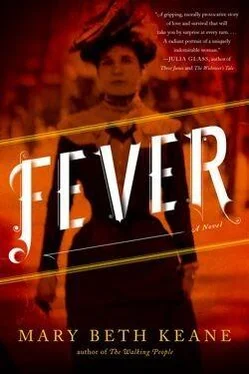“Have you ever made sauerkraut, or do you always purchase it?” Mrs. Kirkenbauer had asked during their first meeting, and Mary admitted that she’d never done either, without adding that no employer she’d ever worked for had wanted sour cabbage and its sharp aroma anywhere near the floral patterns of their halls, the intricate moldings of their ceilings. If Alfred had an evening yearning for it he went out to the streets in search of the roaming sauerkraut man and the steel drum he wore around the city.
“Would you be willing to learn if I showed you once? Are you a quick learner?” How far removed is this woman from her native Philadelphia’s version of the Lower East Side, Mary wondered, but simply answered “Yes.”
Was that all it took to get Mary to agree to leave the city that summer? Had the wages been better than she remembered? No. Years later, when she had all the time in the world to think about it, every hour of the day if she chose, every single minute, nothing seemed to add up, least of all seeing a younger version of herself step off a train to await pickup by Mr. Kirkenbauer himself because they had no full-time chauffeur. Alfred had begged her to decline the job. He’d wanted her to find something closer to home, promising a Fourth of July fireworks show she’d never forget. He’d already begun stockpiling the rockets and sparklers, and planned to invite everyone in their building to watch. But the Fourth of July fell on a Tuesday that year, and Mary didn’t want to organize her summer around one single day, so she left Alfred alone on Thirty-Third Street to fend for himself. Maybe that was the spring when he told her once and for all that he’d never marry her. Not because he didn’t love her, but because he didn’t believe in it. In the old country, fine, some customs could not be shaken, but what was the point of America if two people couldn’t do as they pleased?
Funny how she grew so used to Alfred and the way they were that it was hard to believe there was ever a time when she wanted him to marry her, a time when she thought that he would, eventually, when his mind came around to it, when he admitted to himself and to her it was only the right thing to do. It was even harder to believe that she’d ever considered their not being married their biggest problem. Maybe the summer of 1899 was when she finally admitted the possibility that the things he said were really the things he believed. There was no secret code to crack, no door she could knock upon to make him come around. She was not a woman who should have to convince a man to marry her. There were plenty who would trip over themselves for the chance. That was it, she remembered, a lifetime later, when she went over the details of that summer once again. That must have been it. Her pride was injured. She wanted to teach him a lesson. She wanted space from him to think, maybe to work up the courage to leave him, to try for a different kind of life. So she went away that summer, and wished him the best for his fireworks show, and told him she’d be home on Sundays or she wouldn’t, depending on her mood.
“And there’s a child, isn’t there?” the woman at the office had said during that first meeting, glancing at her notes. Mary noticed that Mrs. Kirkenbauer’s clothes were exquisite, every stitch in its place, the fabric somehow skimming her slim figure and hiding it at the same time. She was younger than Mary, with a beautiful German face.
“Yes, one, a boy. Is that a problem?”
“Of course not,” the agent had said. “Mary loves children. Don’t you, Mary?”
“I do,” Mary said in a flat voice.
Mary did not love all children, but she did love that boy. Within forty-eight hours of her arrival in Dobbs Ferry she saw that there would be no way to keep baby Tobias out of her kitchen, so she told his nanny to leave him, set him up on the floor with a toy and let him watch. The clever boy played happily until his nanny was out of sight, and then he reached his hands up to Mary to be lifted so he could see for himself what she had on the stove. “Spoon,” he said, when he wanted a taste. “Hot!” he warned when he saw steam coming up from a pot. She gave him a new word every day and he stored it, trotting it out a few days later like he was born knowing it. It got so it was lonely in the kitchen without him. When he was there with her she talked to him all afternoon. “You are a good boy,” Mary would say, and he’d beat his chest and say “good boy.” When she dressed in the mornings, long before anyone else in the house was up, she looked forward to the tug of his chubby hand on her skirt, his fat little legs sticking out beneath his short pants. She listened for him coming down the hall before breakfast, running as fast as he could manage toward her kitchen, to see her, to press his soft cheek against hers and say her name.
And then came the morning when he didn’t run to her, the morning when he walked, slowly, and when he got to the kitchen just sat in a corner and watched in silence, his plump cheeks rosy and hot when she touched them. When she lifted him his body was slack, like he was already asleep, and when she carried him he rested his head in the nook of her shoulder and abandoned himself to her, legs splayed across her hips, arms hanging at his sides. “Bread with jam?” she said to him, a test, the treat he loved most in the world. But he just looked at her, glassy-eyed, like he’d gotten older and wiser overnight and had moved beyond the excitement of bread and jam. As if the boy who loved bread and jam was another boy entirely, and this was a new boy, a more serious boy, a boy who knew as much as any adult. For a few minutes, as she swayed with him in the kitchen and listed all the things he loved to eat, she pretended to herself that she didn’t know.
“Tobias isn’t feeling well,” Mary told the nanny, and the nanny told Mrs. Kirkenbauer. The three women convened in the parlor, where Tobias had fallen asleep on a pillow.
“Too much sun yesterday,” his mother said, as she put her hand to his face. “And he had all that pie after dinner last night.”
“Should I ask the doctor to come?”
“No,” Mrs. Kirkenbauer said. “Sleep will cure him. He’ll be better by supper. Leave him where he is.”
But he did not get better; he got worse, and after four days of the doctor coming by to tell them that there was nothing to be done except draw the cool bath and try to get him to eat, and on the same day as Mary served Mr. Kirkenbauer milk that had gone thick and sour overnight, Mrs. Kirkenbauer began to feel low, and then the nanny, and then the butler, and then the gardener, who came only twice a week, always taking lunch with them when he was there. After Tobias they all seemed to get sick at the same time, in the same hour, and God forgive her but she ignored the others until she got that baby into the tub. “Tub,” he said, a whisper, when she put him in the water, keeping a hand under his arm so he wouldn’t slip. She floated chunks of ice she’d hammered from the block and told him they were icebergs, and he a sea captain, and it was his job to make sure the ship didn’t run aground. He didn’t object to the cold. He didn’t demand a toy. He didn’t ask for his mother. He didn’t cry. After the bath, after his fingers had gone to raisins and she was afraid to leave him in there any longer, she wrapped him in a clean sheet and told him stories while he curled up in a ball like he was still a newborn, his knees tucked up to his chest. He looked more like a baby in the sheet, his curls damp, his cheeks so pink that a portrait of him at that moment might have made him look like a healthy child, the healthiest, like he’d just spent an hour running outside on a chilly winter’s day.
And then, on the seventh night of his illness, after a few hours of rocking, while the others called for her from distant rooms, his little body went limp, felt heavier in her arms. His head against her shoulder was a ton weight, his legs like anchors across her thighs. The hot flutter of his breath that had tickled her neck for the past several hours had disappeared. Mary rocked him faster, telling herself he’d be better after he’d had a good sleep for himself. He hadn’t had a proper rest in a week and now he was just having a sleep. Just sleep. A good, sound sleep.
Читать дальше












